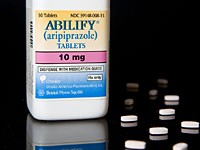



- Viagra
- Sildenafil Citrate (TP)
- Sildenafil Citrate TEVA
- Tadalafil TEVA
- Tadalafil ACCORD
- Tadalafil DAILY
- Vardenafil TEVA
- Vardenafil ZYDUS
- Sildenafil Citrate (GS)
- Cialis
|
Long-Term Use of Bipolar Drug Questioned
2011-05-04
|
Long-Term Use of Bipolar Drug Questioned

TUESDAY, May 3, 2011 (Health.com) — The growing use of a popular drug in the long-term treatment of bipolar disorder is based largely on a single, flawed clinical trial that may be steering doctors and patients away from drugs with a more established track record, a new review published this week in the journal PLoS Medicine suggests.
The drug, Abilify (aripiprazole), was initially used to treat schizophrenia and acute episodes of mania, the better-than-good feeling that characterizes bipolar disorder. In 2005, the Food and Drug Administration (FDA) also approved it for long-term use in bipolar patients whose moods have stabilized (known as “maintenance” therapy).
Since then Abilify sales have more than doubled, according to market research cited in the review. And a 2008 survey of doctors found that it had become the first-choice drug for bipolar maintenance therapy among 23% of psychiatrists and 16% of primary care physicians.
The medical research does not appear to justify the widespread use of Abilify for maintenance therapy, says psychiatrist Alexander C. Tsai, MD, one of the lead authors of the review and a visiting researcher at Harvard University. “We failed to find sufficient data to support its use.”
Tsai emphasizes that individuals taking Abilify for bipolar disorder should not abruptly stop the medication. “It may actually be working for some people,” he says. “But it’s certainly worth talking to your doctor about how it’s working for you.”
After noticing that a growing number of patients seemed to be asking for Abilify by name, Tsai and his colleagues performed an in-depth search of double-blind, randomized controlled trials—both published and unpublished—on the use of Abilify for the long-term treatment of bipolar disorder. Studies of that design are considered the gold standard of medical research.
Their search turned up just one clinical trial, data from which was used in two published studies. The trial was funded jointly by Otsuka Pharmaceutical Co., the Japanese company that developed Abilify, and Bristol-Myers Squibb, which markets the drug in the U.S.
That trial had several important limitations, according to Tsai and his coauthors. For one, they say, it may have been too short to judge the drug’s true effectiveness in preventing mood swings over the long term. The first phase of the trial lasted for 26 weeks, and less than one-fifth of the participants went on to complete the 48-week follow-up phase.
What’s more, the study population was limited to people whose mood had already stabilized on Abilify during the preliminary phase of the trial, and the placebo group therefore consisted of patients who were abruptly switched from Abilify to placebo. The potentially harmful effects of rapid drug withdrawal may have made the placebo group appear artificially prone to relapse—the key finding that made Abilify appear beneficial, Tsai and his colleagues say.





